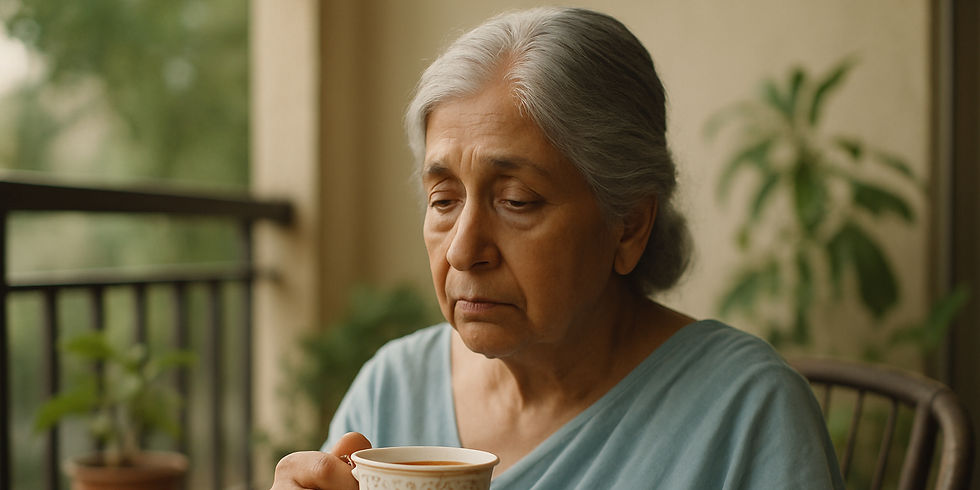Why Advance Care Planning Matters: A Compassionate Step Toward Dignified End-of-Life Care
- saqlainm5
- May 3, 2025
- 4 min read
At Home and Community Care Ltd. (HCCL), we believe that every individual deserves dignity, comfort, and clarity at the end of life. And yet, few of us take the steps necessary to ensure our care wishes are known and respected when it matters most.
The COVID-19 pandemic has powerfully reminded us that life can change in an instant. While healthcare professionals have long encouraged families to prepare for end-of-life decisions, nothing has highlighted its importance more than the experience of real, sudden loss and uncertainty.
So, how do we move from informal wishes to a formal advance care plan that honors our values and reduces the burden on loved ones?
💭 We Know What We Want: We Just Need to Say It
Most of us already have a vision of how we’d want our final days to look. Maybe we want to stay at home. Maybe we don’t want to be resuscitated. Maybe we’d want our favorite music playing or a spiritual leader nearby.
These preferences often come up in everyday conversation, after a family funeral, during a news story, or while watching a hospital scene in a movie. But informal chats aren't enough. Without documentation, our wishes may be lost in moments of crisis.
That’s where advance care planning comes in.
📋 What Is Advance Care Planning?
Advance care planning is the process of reflecting on and documenting your values and preferences for future health care, particularly for end-of-life situations. It ensures that:
Your wishes are honored when you're unable to speak for yourself
Loved ones don’t have to make difficult decisions blindly
Everyone involved feels more confident and less conflicted during emotional times
This kind of planning isn’t just for the elderly or seriously ill, it’s for everyone.
🤝 The Power of End-of-Life Conversations
Talking about dying can feel uncomfortable—but it’s also a deeply intimate and loving act. Whether it’s with parents, a spouse, or adult children, these conversations foster connection, reduce fear, and ensure peace of mind.
Ask yourself:
Would your loved one want to be cared for at home, in a hospital, or in a hospice?
Would they want aggressive treatments like CPR or ventilators?
What spiritual or emotional support would bring them peace?
What are they most afraid of as they approach end of life?
If you don’t know the answers, it’s time to start the conversation—with empathy, patience, and courage.
🛠️ 5 Steps to Create an Advance Care Plan
1. Make It Personal
Start by sharing your own experiences or concerns. For example:
“Remember when Uncle Joe was in the ICU? What would you want if something like that happened to you?”
Or reference the pandemic:
“COVID-19 made me realize how quickly things can change. I want to make sure I know what you'd want if you ever got seriously ill.”
2. Discuss Palliative Care and Medical Options
Talk openly about medical procedures like ventilators, dialysis, or feeding tubes. Some may want everything possible done; others may prioritize comfort over prolongation of life.
Reassure your loved one that palliative care will always include symptom relief—even if they decline certain life-sustaining measures.
3. Choose a Substitute Decision Maker
This person, also known as a Medical Proxy, Health Representative, or Power of Attorney for Personal Care, will speak on your behalf when you can’t. It should be someone emotionally strong, trustworthy, and able to advocate for your wishes under pressure.
Different provinces in Canada have different legal terms and requirements—make sure your paperwork complies with your local laws.
4. Write It Down or Record It
Use a written document, audio message, or video to clearly outline your end-of-life wishes. Include:
Preferred place of care (home, hospital, hospice)
Treatments you want or don’t want
Spiritual and emotional preferences
Any rituals or meaningful touches
Give copies to your doctor, caregiver, lawyer, and close family members.
5. Review It Regularly
As your health, family situation, or preferences change, your plan should too. Regularly check in with your chosen decision maker and healthcare team to make sure everyone is still on the same page.
📅 When Should You Make a Plan?
The best time is now—when you're healthy and clear-headed. Creating your own advance care plan first can even inspire others in your family to do the same.
Imagine sitting down with your parents or adult children, not out of fear, but from a place of love and responsibility. These conversations may not be easy, but they are powerful.
💜 How HCCL Supports Families
At HCCL, we’re here to guide families through every stage of care, from daily support to difficult decisions. Our trained caregivers, therapists, and consultants can help clients stay comfortable, respected, and well-cared for in line with their wishes.
Need help starting the conversation or coordinating care for a loved one?
📞 Reach out to HCCL today. Let’s make end-of-life care something we can all talk about, with grace, honesty, and heart.






Comments